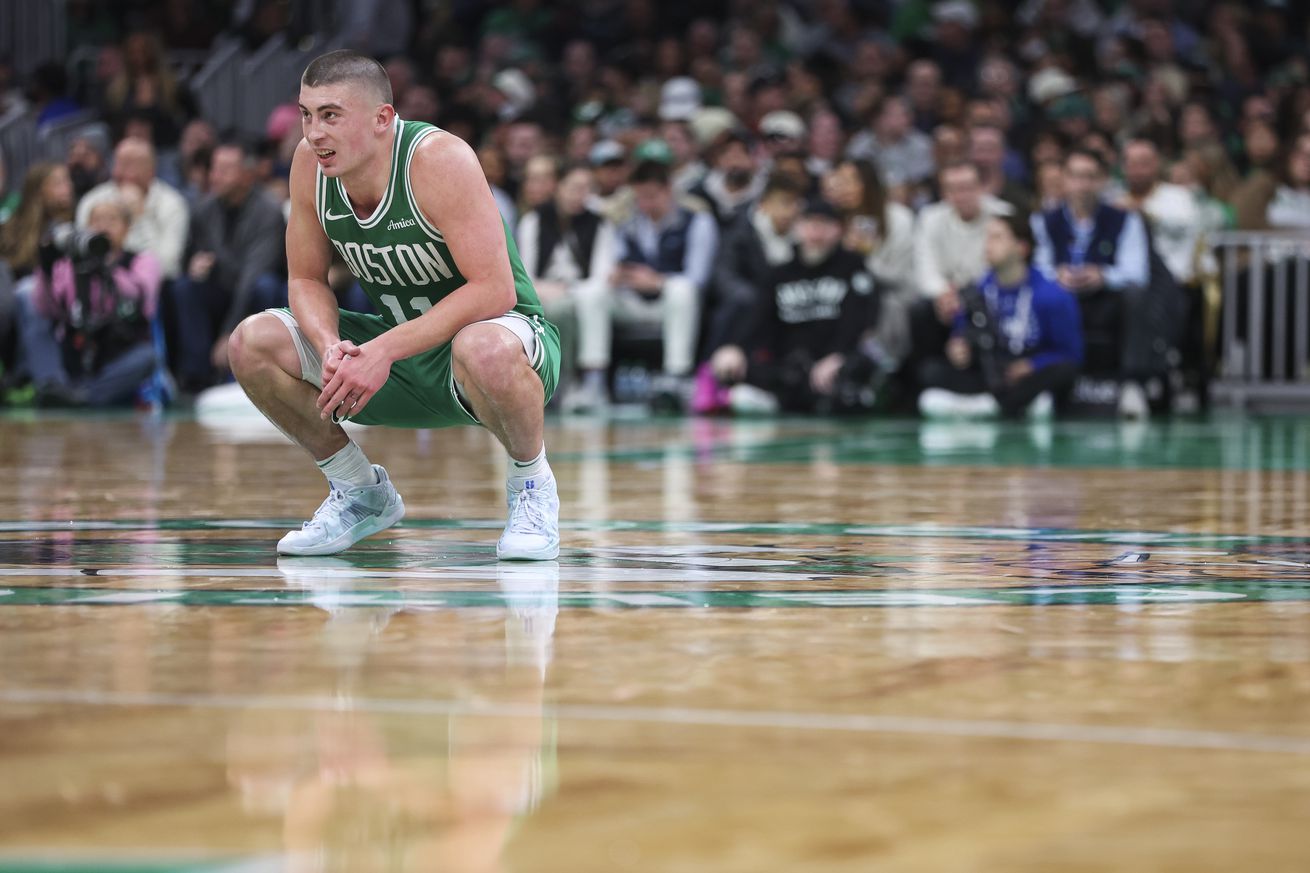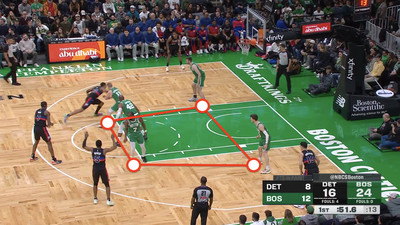
Jaylen Brown’s playmaking growth, Payton Pritchard’s impact on both ends, and Kristaps Porzingis’ unique skill set highlight Boston’s third victory over Detroit. Plus, Drew Peterson’s emergence adds a fresh layer to the Celtics’ depth.
#1 – Jaylen Brown passing on display
As we’ve noticed in previous games, Jaylen Brown’s passing and post-up volume have increased this year. To score the Boston Celtics’ first basket, we saw a great example of this. Brown used his strength and handle to force his way to the rim, attract defensive attention in the paint, and deliver a beautiful pass to Porzingis, who was wide open beyond the three-point line.
A few minutes later, the Finals MVP provided another example of his improved passing and handling. With a live dribble skip pass from his right hand to the corner, Brown showed that he’s taken a significant step toward becoming a playmaker.
We even witnessed a slick behind-the-back assist to Jrue Holiday for a three-pointer. While Brown’s passing numbers indicate there’s still room for growth, Celtics fans can take pride in seeing him continually add new weapons to his skill set.
#2 – Protecting Payton Pritchard…
The Celtics know a lot about hunting mismatches. However, with Jayson Tatum and Sam Hauser out, Payton Pritchard has had to play more minutes than usual. Teams have started targeting Pritchard, as he’s the smallest player on the Celtics’ roster. But this strategy is harder to execute than teams might think.
First, Pritchard is a tough defensive player. Jrue Holiday once said Pritchard was the toughest guy to attack during Celtics training. His toughness, strong legs, and low center of gravity make him harder to exploit. Nonetheless, the Celtics still aim to protect him, employing some subtle defensive plays to ensure he isn’t targeted.
For example, the Celtics switched off-ball to prevent the Detroit Pistons from isolating him in the post. Usually, the Celtics switch off-ball to keep the roamer (often Porzingis or Queta) as close to the rim as possible. In this case, the approach was reversed, but the goal remained the same: protect the rim and ensure nobody gets hunted.

Sometimes, the Celtics can’t switch Pritchard away. When this happens, they crowd the paint to close driving lanes, making it nearly impossible to attack him effectively.
#3 – …so he can deliver on offense
The Celtics are willing to protect Pritchard at all costs because of what he brings on offense. He delivered another excellent performance, shooting over 60% true shooting on 20 attempts, along with 10 assists.
As usual, his presence on the floor correlated with a strong offensive performance by the team. With him on the court last night, the Celtics posted a 134 offensive rating. Over the last two seasons, the team’s offensive rating has improved by +6 points per 100 possessions when he’s on the floor (per Cleaning the Glass).
A highlight of his game last night was his playmaking. While some of his assists were simple, he also made impressive reads, such as an alley-oop to Kornet or the pass mentioned above that gave Walsh an open shot. His size will always limit certain passing angles, but his speed and improved court vision suggest his contributions could be even more valuable in the future.
#4 – Second-quarter run
From 37-33 to 59-42, the Celtics created a gap in the second quarter to ensure they could rest their starters early. After a stretch of tough games in a short period, the Celtics capitalized on the opportunity to conserve energy. How did they do it? By sticking to their usual game plan.
Using staggered screens to force mismatches and create gaps, the Celtics generated optimal scoring opportunities. With stacked screens set by Pritchard and Porzingis while Brown handled the ball, the Pistons were trapped. They couldn’t help from the baseline, as Derrick White and Jrue Holiday were stationed in the corners, forcing Detroit to switch.
This resulted in three simultaneous mismatches: Brown against Cade Cunningham, Porzingis overpowering Tobias Harris in the post, and Isaiah Stewart struggling to defend Pritchard on the perimeter. The Celtics could then pick their preferred option and score with ease.
#5 – Transition defense is back?
Last night was a masterclass in transition defense—arguably one of the best performances across the NBA this season. The Celtics not only limited the Pistons’ transition volume but also destroyed their transition efficiency.
They held their opponents to just 50 points per 100 possessions in transition, an impressive feat showcasing the team’s concentration, teamwork, and hustle. Joe Mazzulla must be thrilled with this display.
#6 – Kristaps Porzingis’ gravity and passing are killing defenses
In the modern NBA, players create spacing in various ways, and Porzingis’ approach is unique. One of his underrated skills is passing. With his size, he can operate as a hub and deliver passes over defenders with precision.
On the play above, Brown didn’t need the ball in his hands to be a threat. He cut to the rim around Porzingis, who timed the pass perfectly, generating three easy points from a simple sequence. Another example involved Luke receiving the ball from Porzingis, cutting, and kicking out to the corner—a testament to Porzingis’ ability to see the floor and facilitate.
While his passing volume could increase, the Celtics might be able to develop this aspect of his game, unlocking another tool to collapse defenses.
#7 – No new highlights in the Derrick White vs. Cade Cunningham duel
As Mark Aboyoun noted on CelticsBlog, the ongoing duel between Cade Cunningham and Derrick White has been fascinating. In previous games, Cunningham posterized White, who responded with emphatic blocks.
However, last night’s encounter was relatively quiet, with only this post-up moment standing out. With the Celtics dominating early, fans will have to wait for the next matchup to see this rivalry reignite.
#8 – Boston’s unselfishness
After the game, John-Blair “J.B.” Bickerstaff praised the Celtics, calling them one of the most unselfish teams he’s seen.
Pistons coach JB Bickerstaff said the Celtics are one of the most unselfish teams he’s seen:
“Everybody goes out and they repeat what their stars do. Jayson Tatum, Jaylen Brown, those guys could shoot the ball every time they wanted to. But they sacrifice themselves to make the… pic.twitter.com/BkUJOVAA89
— Noa Dalzell (@NoaDalzell) December 12, 2024
Last night, 73% of Boston’s field goals were assisted. While the Celtics lead the league in isolation volume, their ball movement remains elite. With every player logging over 10 minutes recording an assist, this game highlighted the team’s collective playmaking ability.
#9 – Three-point defense
The Pistons’ three-point efficiency dropped dramatically from 36% to 18% against the Celtics. After two games shooting over 50% from deep (against Boston and New York), Detroit was stifled by Boston’s improved rotations and defensive adjustments.
While early-season noise questioned the Celtics’ defensive capabilities, last night they showcased flashes of the elite defense that defined them last year.
#10 – Drew Peterson on the rise
One emerging storyline is the rise of Drew Peterson. Last night, he logged nearly 20 minutes, earning Joe Mazzulla’s confidence and outpacing Jordan Walsh and Queta in playing time.
Though his game can feel disjointed as he overthinks plays, Peterson demonstrated promising flashes of playmaking. His combination of length and handle makes him a potential connector.
His scoring remains a question mark. While he showed good touch during his NCAA career, his efficiency is limited (54% true shooting). Can he develop into an elite shooter and connector? Time will tell, but the potential is exciting.